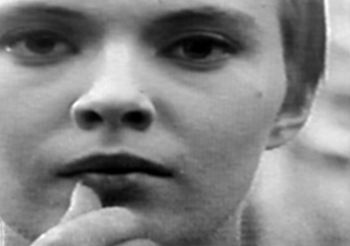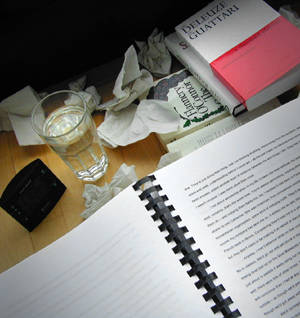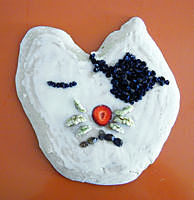|
|

|
|||||||
|
|
Present Past Subjects Projects Misc |
MARCH 2002
(Untitled) Brave new month... Lost and found: person, place or thing once de-territorialized now re-territorialized. A perceptive reader writes in:
(Alamut link: When the keeper of the prison awoke and saw that the prison doors were open, he took a sword and would have killed himself, for he thought the prisoners had escaped. Acts 16:27)
(Untitled) The Notwist. I'm waiting to borrow their latest: Neon Golden (Pitchfork Review), from the local library. I'm patiently waiting because I've just discovered their earlier release (1998's Shrink) and feel all excellent and happy dancing around the room to the song 'Chemicals'. Chemicals. Will hurt you. Chemicals. Will knock you down... (It's a happier song than the lyrics indicate. Honest.) Who isn't subject to waves? (31.05.00.) "Waves are vibrations, shifting borderlines inscribed on the plane of consistency as so many abstractions." (Deleuze and Guattari) Why can't waves be another word-sign for angels?
(Untitled)
(Untitled) Alamut is 4 years old today. Last year on this day I wrote a letter to myself... to read today. Caterina: "Animals are the unfallen. Like children without language." Okay so here comes that flu... Let It Come Down (Bowles). Important calls with important people, including Mr. Boy telling me about 'Mr. Boy'*; Renee Turner, the aftermath of her grandmother's funeral; and she, her dream desk. *In the course of our discussion of 'a casa e' o corpo' (the house is the body), Rogério's latest assignment to his students, he tells me about 'Mr. Boy', a novella by science fiction author James Patrick Kelly. What he describes is most interesting. While I can't find the novella online, I do find a reference to it on this page at MIT:
Noise Running Today's marvel: haecceity* (thisness, individuality). * Pronunced: 'HEKS' (Dutch for witch) 'SEE' - 'ITY'.
(Untitled (sickbed)) For I wonder when I read D. & G.'s proposal: "There is a mode of individuation very different from that of a person, subject, thing, or substance. We reserve the name haecceity for it." whether or not we can think of this 'haecceity' as something similar to James Gibson's or Gregory Bateson's 'ecologies' or Korzybski's adage 'Organism-As-A-Whole-In-An-Environment'; and I wonder at how it is not at all easy to perceive 'thisness' over 'thingness'; and wonder even more how my friend Norman ever got so wise as to once insist to me that (at least in aging and death) "The nouns are the first to go." Oh-oh. Good stuff. (1977) Q: So why do you think that Luis Buñuel used two different actresses to portray the maid Conchita in his last film That Obscure Object of Desire (Cet Obscur Objet du Désir)? Could this (this!) person-character be seen as an event, a haecceity? See too: Identity and Individuality in Quantum Theory (Stanford Encyclopedia of Philosophy). (2002) Current pleasure: Dettinger Oasis. You Are an Angel
You are an angel in-fluidity, influence. You are an angel in your many affects. Aristocracy. There! I said it. (Even though my friend R. gags whenever I use the term). Reading...
Swap Meet A visit from Sato who comes to trade the following quote from Kafka... "I can swim like the others, only I have a better memory than the others. I have not forgotten my former inability to swim. But since I have not forgotten it, my ability to swim is of no avail and I cannot swim after all." ... for a passage I'd read in 'The Notebook of Malte Laurids Brigge' (where Rilke's protagonist sees and follows a gentleman walking with a nervous-muscular anomaly). After she's left, searching for an explanation for Rilke's passage (what was wrong with that strangely moving gentleman?), I find this article... Physically Remembering Childhood (Phenomenology Online). ... which, though it doesn't answer my specific question, still provides me with a lot to think about. (Blood memory... Lygia Clark anyone? or Nabokov's eariest memories.) "For Rilke ... the progression is rather from feelings through experiences through memories through forgetting to what can be called, adapting Rilke's own words, blood-remembering." (Mood, J.J.L., 1975) Swap Meet Cont. So okay this arrives in my 'IN' box:
Although a search rules out the possibility that this mail has been directed at me personally (it is a well known spam) as a request for help I find it extraordinarily sympathetic. What if we could suddenly 'jump' back to an earlier version of ourselves? (See Alamut entries...
... where for a period of 3 days I was convinced this was actually happening...) A jump... ie. a discrete quantum movement (first here and then there) rather than an extremely fast passage (rewinding) from point B back to point A. A jump meaning we don't need to attempt (and who knows for sure? maybe it is impossible) to slowly decompose Rilke's progression: experience -> feeling -> memories -> forgetting -> blood memories A jump with a body that knows (with the magic of full knowledge such as in the request above, remembering "what we know now") into a body that does not know now. A jump where we simultaneously 'forget' and wake up with 'blood memory'. A jump from death to life, where we wake up our own Lazarus. Rogério (contemplating his death and subsequent rebirth as a DreamCast avatar) writes on latenightpool.com: "I remember something else: in his very entertaining autobiography 'Freedom in Exile' the Dalai Lama writes about when, after being identified as the reincarnation of the previous Lama and being moved into the Potala Palace, he finds a room containing telescopes and other optical equipment that belonged to one of his previous selves. He ponders that he (he) must have really enjoyed those objects. He doesn't remember. He accepts: this has been my home for many years and many lives; here I am again." Swap Meet Cont. "Children are Spinozists... Spinozism is the becoming-child of the philosopher." (D. & G.) For Andrea Paciotto Dear Andrea, Following our discussion last Sunday on human 'disinterest' and violence I've been reading bits and pieces -- mainly by Deleuze -- over Spinoza's Ethics. Deleuze not only manages to tweak one's curiosity about this philosopher (my own curiosity was tweaked trying to understand 'Memories of a Spinozist I' and 'Memories of a Spinozist II' in D & G's tenth plateau...) but he is also an excellent teacher of Spinoza's system. Deleuze's seminar from the 24th of January 1978 probably contains everything you will ever need to know but for your interest I've enclosed a few of the other references which I've been reading. Looking forward to our meeting on Tuesday. Best, -- Paul
Gilles Deleuze, Spinoza, Practical Philosophy Roger Scruton, Spinoza (The Great Philosophers Series) Roger Scruton, Spinoza (Past Masters Series, Oxford Univ. Press) 46 Things (Part I)
46 Things (Part II)
An Arabian Nights Short List (Orientalism revisted. Ontological vertigo. Tales within tales within tales.)
Listology Bruce Barone writes:
Thanks Bruce... I love lists and the community of people who make them (Amazon's Listomania, Listology.com) and have long intended to address the state of lists here (one of my favorite programming languages being John McCarthy's Lisp). Isn't a weblog simply an annotated list? Oh Fuck Saul William's Amethyst Rock Star. Hoo-doo. Delirious. The track Robeson:-- (with shady recollections of the garden of the summer of the litany of P. Smith's 'Horses' and the cello of L. Reed's 'Street Hassle' and the afternoon when the gay ex of my ex-landlady defined forever for me the word 'ephemeral' as "like a butterfly...") "... and there is no greater crime. I will never commit it again." This is the true bodacious kiddo. The righteous rime. "We do hereby declare reality unkempt by the changing standards of dialogue." Life... life... 1001 Nights Gerhardt, Mia. The Art of Storytelling: A Literary Study of The Thousand and One Nights. 1963. Ghazoul, Ferial Jabouri. The Arabian Nights: A Structural Analysis. 1980. Irwin. R. The Arabian Nights: A Companion. 1994. Naduff, (or Naddaff) S. Arabesque: Narrative Structures and Aesthetics of Reception in 1001 Nights. 1991. Pinault. D. Story Telling Techniques in the Arabian Nights. 1992. Contemplating stories and story telling beneath one's 600th full moon. (16,809 / 28 = 600.32) Easter-tide
ALAMUT.COM is artist owned and operated.
|
|
|||||









